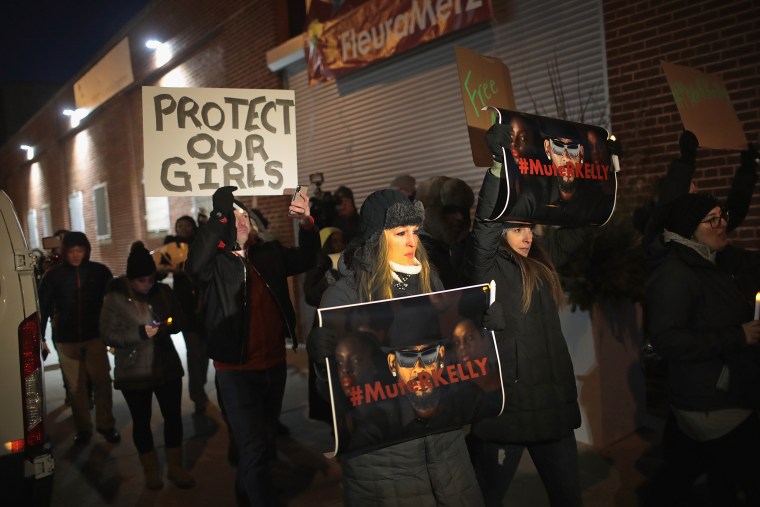Seventeen years ago, R. Kelly faced sexual misconduct accusations relating to a minor that bore similarity to the charges slapped on the R&B singer Friday in Cook County, Illinois.
In the 2002 case, Kelly was accused of child pornography after a video appeared to show him having sex with and urinating on a teenage girl. He was acquitted of all charges in 2008.
This time, experts say, the outcome could be different.
Kelly, 52, was charged Friday with 10 counts of aggravated criminal sexual abuse with an indictment that listed four victims, at least three of whom were under age 17 at the time of the alleged abuse.
Legal scholars said there are a slew of factors working against Kelly that didn't apply in the prior case: There are multiple alleged victims this time, and far less tolerance for indecent sexual behavior now, in the #MeToo era.
"In any case where you have multiple victims, it is just infinitely more difficult for the defendant, because it's difficult to attack woman after woman," said Douglas Wigdor, a former prosecutor and New York City-based litigator who represents sexual assault victims, including some of Harvey Weinstein's accusers.
"I think given the number and the times we live in, it will be an uphill battle for him," Wigdor said.
Kelly was found not guilty in 2008 of the 2002 allegations in part because the alleged victim was not willing to testify, a handicap for prosecutors. The lack of testimony by the accuser enabled Kelly's powerful defense team to create an impression among jurors that the girl's identity, and therefore age, were not able to be determined, experts said.
Also in that case, the musician faced a lesser charge of child pornography than the multiple charges of aggravated criminal sexual abuse filed against him now.
Law professor Monu Bedi, of DePaul University College of Law in Chicago, said the charges this time indicate a more confident prosecution.
Prosecutors in 2008, he said, likely opted for child pornography because they did not feel they would be able to make a case for sexual assault charges without the alleged victim's cooperation.
"My suspicion, given that there's multiple girls, that suggests to me that the victims are going to be cooperating and going to be involved in the prosecution," he said.
Accusations of sexual misconduct have swirled for more than two decades around the singer, best known for his Grammy-winning hit "I Believe I Can Fly."
He reportedly wed the R&B singer and actress Aaliyah in 1994, when she was just 15 and widely described as his protégé. The marriage was apparently later annulled.
"People who have been covering this case for more than a decade have known that this has been a problem, said veteran music journalist and People TV anchor Lola Ogunnaike, who wrote a cover story in 2002 for Vibe Magazine about Kelly's scandals. "The fact that it was largely ignored by the music industry was also deeply problematic."
The singer and his lawyers have consistently denied any wrongdoing in response to allegations against him over the years.
On Friday, his lawyer Steve Greenberg in Chicago said authorities are making Kelly a sacrificial lamb and that the musician "will go to bond court" on Saturday and will eventually "be acquitted."
Ogunnaike credited a six-hour Lifetime documentary, "Surviving R. Kelly," which aired last month, coupled with the #MeToo movement, with spurring the renewed focus on Kelly. The documentary outlined in graphic detail numerous sex abuse allegations against him.
Bedi said he also suspected that the documentary played a "substantial role" in getting charges brought against Kelly.
"I'd be hard-pressed to believe that some of the victims and their families did not see this documentary and say, 'We have to come forward.'"
"I'd be hard-pressed to believe that some of the victims and their families did not see this documentary and say, 'We have to come forward,'" Bedi said.
There is a precedent for celebrities who previously escaped charges getting convicted in the #MeToo era. Last April, comedian Bill Cosby, who was accused by more than 60 women of sexual misconduct, was found guilty of three felony counts of aggravated indecent assault in the only case against him in which the statute of limitations had not expired.
The Cosby verdict came after a prior trial against him — which took place months before the sexual harassment reckoning swept Hollywood, the media, politics and other industries — ended in a hung jury.
Kelly, a Chicago native whose real name is Robert Kelly, will appear in court on March 8 on the new charges.
While he has never been convicted, the accusations against Kelly appear to have cost him in other ways.
He and his record label, Sony Music, parted ways in the wake of the docuseries, and he has lost support from some celebrities he once sang alongside, including Lady Gaga, who last month said she would remove her 2013 single "Do What U Want (With My Body)" from streaming services because it featured vocals by Kelly.




